Why we are now in the “Golden Age of Product Management”

Just a few years ago, product management was a function that did not have a clear definition.
For many companies, product managers were confused for user experience designers, senior technology leads, or, more controversially, project managers. At best, teams acknowledged that PMs were product owners in the Agile sense, and as such their main deliverable was the product backlog. The real impact of product management was often misunderstood and PMs did not have the software or resources to carry out their best work.
These days, we see a very different picture. Digital product managers are one of the hottest and fastest-growing roles in business, and product enthusiasts are hungry to excel in their field and share knowledge with one another. We’ve coined this rise to prominence the “Golden Age of Product Management.”
In this piece, we first take a look at the growth of product management roles and associated trends. Later, we explore why the accelerated pace of the technology market, digital transformation, fierce competition, rising customer expectations, and the demands of an increasingly data-driven world make product management such an in-demand role for organizations today.
The growing demand for product professionals
In recent years, product management roles have steadily risen in both demand and popularity.
A study conducted by Neal Iyer for Product Management Insider shows that the number of product management roles in the US have grown by an astounding 32% from August 2017 to June 2019 — a short two-year period. In August 2017, the number of PM-related jobs open on LinkedIn and Indeed was 13,490. In June 2019, that number jumped to 17,801.
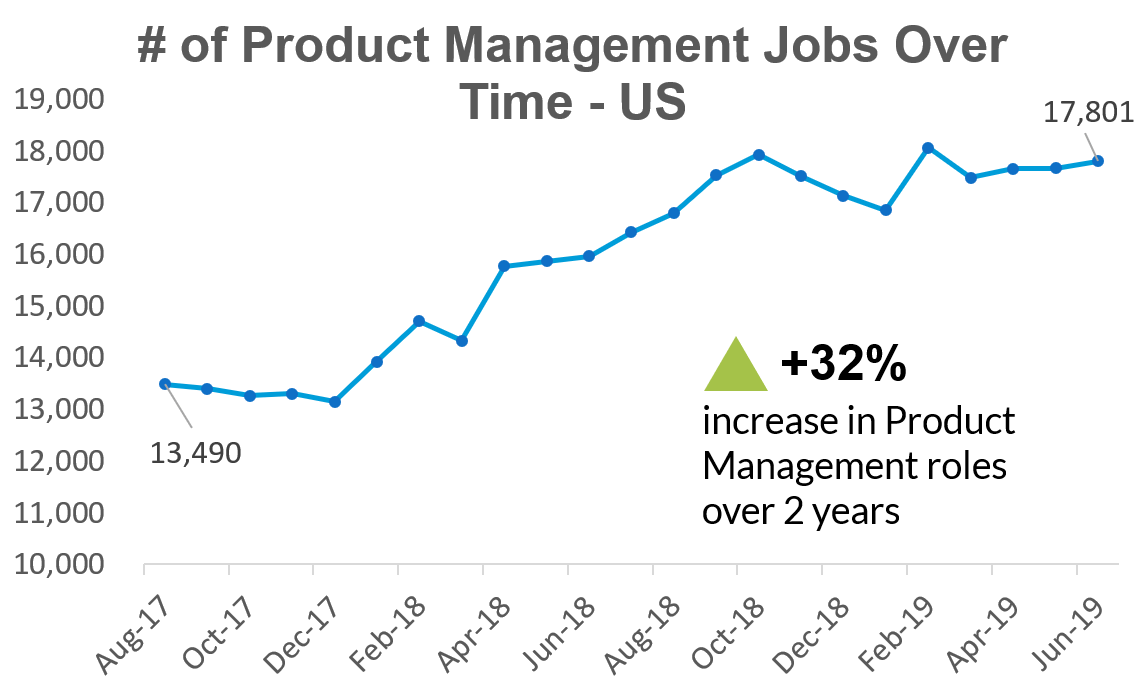
The increase in demand that we are seeing for product management roles in the US outpaces the average increase in demand for other roles in the US by 5x. (While there was a 32% increase in demand for PMs over the last two years, the increase in demand for overall roles in the US was just 6.6%.)
The increase in demand for product management roles in the US outpaces the increase in demand for overall roles by 5x.
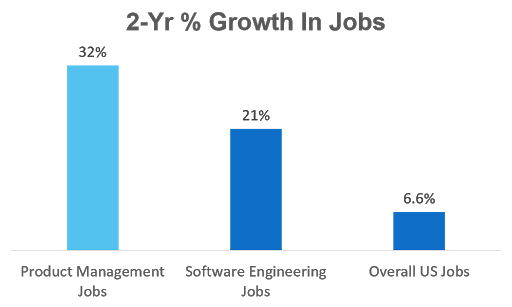
Accompanying the proliferation of product management roles, online interest in PM careers is exploding. Interest in the search term “product manager jobs” has increased by 270% since Nov 2014, and Interest in “product manager salary” by 303%.
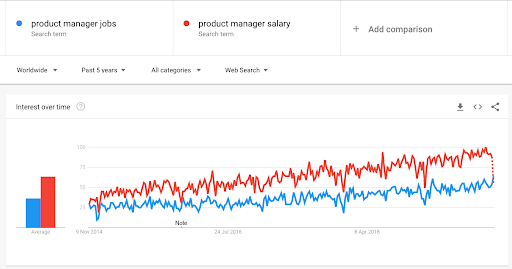
Interest in the search term “product manager jobs” has increased by 270% since Nov 2014, and interest in “product manager salary” by 303%.
Interestingly, most companies are looking specifically to hire mid-to-senior-level product management roles. There has been a 26% growth in mid-level product management roles over the last two years and a 51% growth in senior-level product management roles. Entry-level roles only experienced a small bump of 10%.
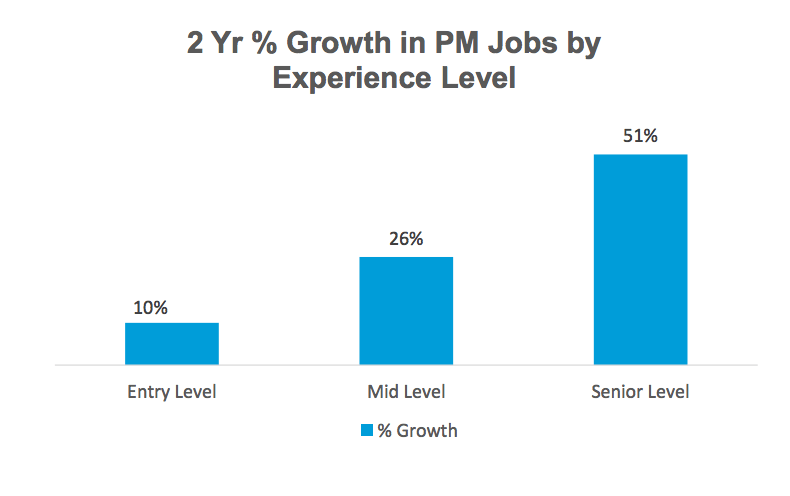
Looking at these numbers, it makes sense why tech-focused communities like Product Manager HQ, General Assembly, and Product School are beginning to offer product management education programs. PM intensives like these equip job-seekers with the skills they need to fill the growing demand for mid and senior-level PM roles, especially with the noticeable lack of formal PM education at most higher education institutions.
Colleges and universities, however, are starting to jump on the PM bandwagon. In 2018, Carnegie Mellon University’s top-ranked Tepper School of Business and School of Computer Science introduced a Master of Science in Product Management. The program is the first of its kind, and we predict that many more will follow.
Why are we in the golden age of product management?
Not only are the number of product management roles (and interest in the field) soaring, organizations are specifically seeking PMs with a wealth of experience to lead the product function.
Why is product management so important these days? And why are senior product leaders so desperately needed? Let’s dive into the realities that are fueling these trends.
The accelerated pace of the technology market
As Winston Christie-Blick, Product Marketing Manager at productboard, eloquently wrote in a recent blog post, the pace of the technology market has accelerated dramatically.
In 1878, the telephone — a technology that would change the way we communicate forever — was introduced to the world. It took 80 years for the telephone to reach 100 million users.
A century later, the mobile phone was invented. In 20 years, it hit the same mark.
Fast-forward to the new millennium, and Facebook reaches 100 million users in less than five years. Instagram takes a little over two years. Fortnite, just nine months. You get the point.
These days, new entrants can enter the market overnight and reach thousands of users and millions in revenue in months — not years or decades. And it’s up to modern organizations to keep up.
You snooze on the quality of your product experience, you lose.
Digital transformation
“Digital transformation is the process of using digital technologies to create new — or modify existing — business processes, culture, and customer experiences to meet changing business and market requirements. This reimagining of business in the digital age is digital transformation.” — Salesforce
To keep up with growing customer demands in the age of digital transformation, it is now more important than ever for companies to deliver excellent digital experiences that align with their existing products and services.
Sounds easy enough, but in practice, creating a seamless experience connecting the online and offline is exceedingly difficult. This holds true even for big names like GE, Proctor & Gamble, Lego, and Nike, all of whom have failed in major digital transformation efforts.
As Harvard Business Review puts it, “digital is not just a thing that you can buy and plug into the organization…digital transformation is an ongoing process of changing the way you do business.”
These days, organizations are turning to qualified product professionals to oversee the digital arm of business and overcome the challenges of digital transformation. This, in turn, creates more opportunities for ambitious product managers around the world.
Fierce competition and rising customer expectations
A 2017 report from Price Intelligently shows that modern SaaS companies have more than nine competitors in their first year of business. Five years ago, that number was 2.6.
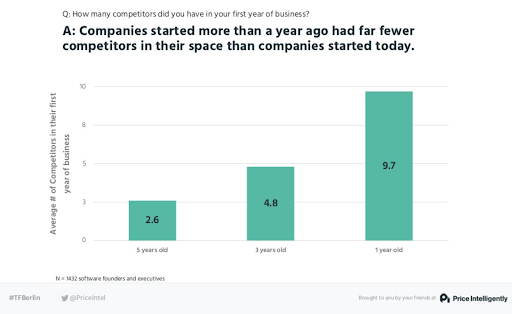
Meanwhile, customer expectations are sky-high for better and more personalized product experiences.
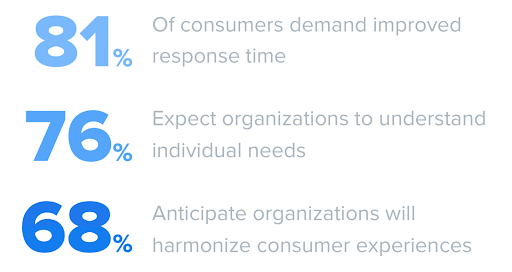
Today’s hyper-competitive climate means that companies must gain a deep understanding of their customers and deliver sophisticated products that meet their needs. And they must do it fast. If competitors offer superior features, a better user experience, or forge stronger relationships with their user community, you will not be able to depend on their loyalty. HipChat seemed great until Slack came along.
So, staying on top of user needs, competitors, and the ever-shifting conditions of the market now falls on the plates of a growing army of product managers.
Navigating an increasingly data-driven world
Alongside the trends mentioned above, a McKinsey report suggests that companies can no longer ignore data when it comes to making product decisions and competing in saturated markets. This includes both quantitative data (analytics you collect on how people are using your product so you can make iterative improvements) and qualitative data (user research, notes from sales calls, user-submitted feature requests, and market/competitive analysis and other inputs that can affect the trajectory of your product and business).
More and more, a dedicated role is needed to collect, understand, and incorporate data into the product-building process. Hello, product managers!
A dedicated role to face modern challenges head-on
Product managers are the professionals who are best-equipped to face the challenges unique to today. That’s why modern organizations are hiring more (and better-equipped) product professionals who can deeply understand users, collect and process data, set product vision and strategy, and evangelize product within the company.
And, as people learn about this well-paying, multi-faceted role, they become more interested in pursuing it for themselves.
The golden age of product management has made way for other tangential trends. There is now an increasing demand for the role of Chief Product Officer, for example, and, as mentioned above, prestigious universities like Carnegie Mellon are introducing PM-focused academic programs to train aspiring product leaders.
PM communities like Mind the Product recruit new members daily and currently boast an active community of 150,000+ around the world. Many others — like Product School, Product Manager HQ, and Product Collective, to name a few — are gaining traction as well.
Finally, technology solutions specifically designed to help product managers succeed are emerging. While sales has Salesforce, marketing has Marketo, and engineering has Jira, product managers were, until recently, left behind. Now, product management systems like productboard help product managers excel in the core functions of their jobs.
So, it seems that product management is here to stay, and we are excited to be on the frontlines.
Welcome to the golden age!
. . .
productboard is a product management system that enables teams to get the right products to market faster. Built on top of the Product Excellence framework, productboard serves as the dedicated system of record for product managers and aligns everyone on the right features to build next. Access a free trial of productboard today.






